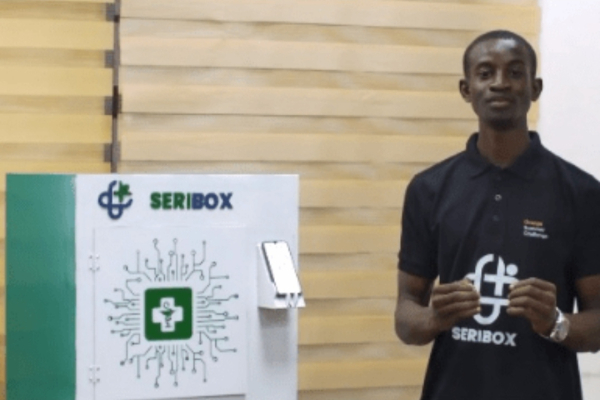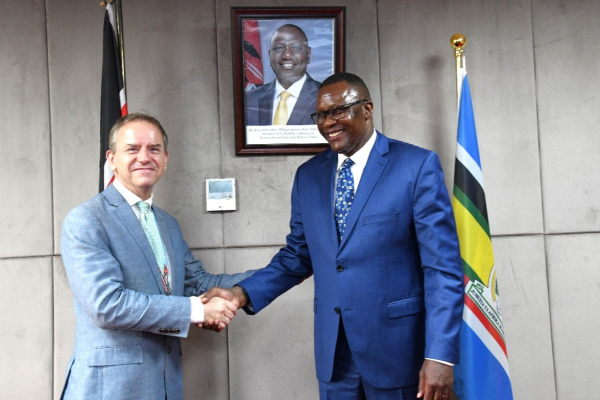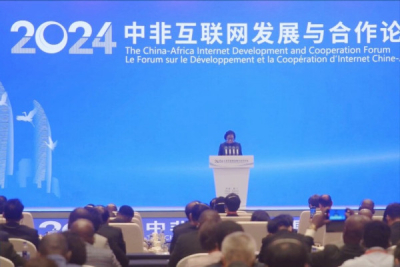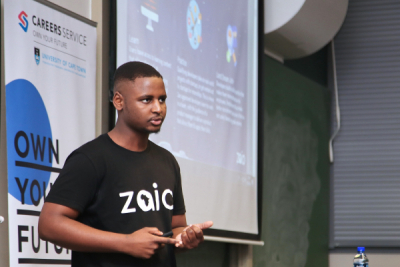The solution was set up by young tech entrepreneurs to make it easier for people to buy medicines in local languages. It won first prize at the 2023 Orange Summer Challenge.
Seribox, an e-health solution developed by the Sily Group, leverages artificial intelligence and the Internet of Things to enable users to acquire medicines in local languages. The group, led by Youssouf Djafara Diallo, initially showcased its solution at the 2023 Orange Summer Challenge. This competition, organized by telecom operator Orange, assembled students from diverse universities across 15 countries in Africa and the Middle East.
Seribox operates as a medicine dispenser that can be procured via a smartphone functioning as an order terminal. Users simply press the microphone icon button, akin to creating a voice note on an instant messaging application, to place an order in their chosen local language. In a demonstration video, Diallo placed orders in Sousou and Peulh, two local languages prevalent in Guinea.
The system responds in the order’s language, ensuring to repeat the ordered medicine’s name and its price. It automatically shifts the order to the shopping basket, with the option to add more orders to the basket. Upon completion of this stage, users validate the order by pressing the corresponding green button. The terminal then displays a QR code, allowing the bill to be paid via the Orange Money application. Once payment is confirmed, the dispenser releases the ordered medicines for the user to collect without any issues.
It’s important to note that Seribox does not dispense medicines that require a doctor’s prescription. Doctors must log into a dedicated platform to prescribe drugs that can be utilized on Seribox. They can prescribe up to four drugs per prescription, and upon doing so, the system generates a QR code. Users can photograph the prescription or have it printed on paper to place their order with Seribox. An order can also be canceled by sending a voice message to the device.
Adoni Conrad Quenum
In a post shared on the social network X on Thursday, April 4, the Kenyan Cabinet Secretary for Information, Communications, and the Digital Economy, Eliud Owalo, disclosed a meeting with the United Nations Resident Coordinator in Kenya. The officials discussed the digital transformation program, the empowerment of micro, small, and medium-sized enterprises, and the country’s startups.
The benefit of remote work culture to African technology adoption lies in its capacity to democratize access to global talent and foster collaboration across borders, among others, thereby propelling Africa's technological advancement.
South Africa has officially passed its digital nomad visa regulations into law, following a draft released in February. The law, which took effect on 28 March 2024, paves the way for the issuance of digital nomad visas. This move aims to attract international talent and stimulate economic growth.
The regulations follow months of deliberation and public consultation. Despite concerns about its impact on the cost of living and tax leakage, the government is optimistic about the benefits for the economy.
South Africa's diverse landscapes and thriving tech scene make it an attractive destination for digital nomads. According to the ‘State Of The ICT Sector Report’ released on 31 March 2024, 5G network coverage in the region has seen a significant increase, growing from 20% in 2022 to 38.42% in 2023, while all provinces in urban areas have achieved 97- 100% coverage for both 3G and 4G/LTE networks. This growth is attributed to the substantial investments in mobile infrastructure. The enhanced network reliability and speed are expected to boost IoT and digital service advancements, marking a notable step in the transformative journey of this new era of remote work.
The digital nomad visa is crucial for driving technology adoption in Africa by attracting global talent, fostering knowledge transfer, promoting entrepreneurship, strengthening tech ecosystems, and encouraging remote work culture.
Hikmatu Bilali
In January 2023, Ghanaian fintech Zeepay raised $10 million, bringing the total funds raised since its launch in 2014 to $24.6 million. The company aims to continue its expansion in its markets and to attract new capital.
Ghana-based fintech firm Zeepay has successfully concluded a funding round, securing an undisclosed amount from pan-African investors including Africa50, Oikocredit, Injaro, Verdant Capital Hybrid Fund, and I&P. The announcement was made in a press release on Thursday, April 4. The funds are set to bolster Zeepay’s operations in cross-border remittances and mobile money in Africa and the Caribbean.
Andrew Takyi-Appiah, the startup’s founder, stated, “The raise will greatly assist us in completing our ongoing expansion drive into the rest of Africa. Our short to medium plan is to expand our mobile money reach into a minimum of 10 countries within the next two years, leveraging remittances in partnership with MoneyGram, and we are delighted to see this vision come through.”
Established in 2014, Zeepay specializes in facilitating instant remittance settlements to mobile money wallets in Africa and the Caribbean on behalf of leading international money transfer organizations (IMTOs). The fintech firm, which operates in around 20 countries globally, has already raised over $24 million to accelerate its growth, particularly in Africa and the Caribbean. Through its technology and various partnerships, Zeepay enables real-time money transfers abroad via a mobile wallet to more than 150 countries.
The fintech sector is the most appealing segment of the African technology industry for investors. In 2023, young entrepreneurs in this segment raised $852 million, and $1.9 billion in 2022, as per data from Partech Africa, a tech investment firm with offices in Dakar (Senegal) and Nairobi (Kenya).
Adoni Conrad Quenum
Africa, the world’s youngest and most vibrant continent, stands to leverage artificial intelligence (AI) for economic expansion. Yet, appropriate backing is required for the continent to harness this technology effectively.
China is eager to enhance its partnership with Africa in the realm of artificial intelligence (AI), the Cyberspace Administration of China (CAC) stated on Wednesday, April 3. The announcement followed the China-Africa Internet Development and Cooperation Forum, which took place in Xiamen, China, from April 2 to 3.
The CAC statement outlined cooperation areas, including AI research, technological advancement, and its application in Chinese and African academic and research institutions. Key sectors such as agriculture, healthcare, education, and urban management will also be involved. The collaboration will extend to digital infrastructure development, talent exchange, capacity building, cybersecurity, and data protection.
The declaration comes as African experts ponder the enormous opportunities that this technology could bring to the continent, provided the right policies and infrastructure are in place. According to a recent analysis by the US think tank Brookings Institution, only seven African countries have developed national AI strategies, and none have implemented formal AI regulation.
Collaborating with China, a country advanced in AI, could empower Africa to establish supportive policies and robust infrastructure, harnessing AI’s boundless opportunities and propelling its development. As per PwC’s Annual Global CEO Survey, AI could add $15.7 trillion to the global economy by 2030, with Africa potentially generating $1.2 trillion, signifying a 5.6% rise in the continent’s GDP by 2030.
Samira Njoya
He is committed to fostering a new generation of young tech innovators and entrepreneurs. He has helped hundreds of young software developers get jobs with major companies.
South African entrepreneur Mvelo Hlophe (photo), founder and CEO of Zaio, spearheads initiatives to transform South Africans into leaders and innovators through training programs. Through his company, Zaio, he focuses on equipping individuals and businesses with computer programming skills.
Established in 2017, Zaio is an online platform aimed at providing Africans with digital skills training and assisting budding software developers in securing their first jobs.
“We are training the next generation of tech leaders on the continent. Our approach is so novel and when people start realizing just how great it is, there will be a shift in our EdTech platforms, the value they bring, and how suited they are to individual users. Ours is to create a foundation, not only by increasing the pool of quality talent on the continent but also to create a standard when it comes to EdTech products our people will interact with,” Hlophe stated in 2022.
By 2023, the startup had already registered over 10,000 users. Its platform has facilitated 200 users in obtaining developer positions with organizations such as Sanlam, the World Bank, and Standard Bank. Zaio aims to broaden its operations across the continent, targeting regions like Kenya, Nigeria, and Egypt.
Hlophe, a graduate of the University of Cape Town with a Bachelor’s degree in Finance and Accounting (2017) and a Bachelor’s degree in Politics, Philosophy, and Economics (2020), is an impact entrepreneur with Further, a company that supports entrepreneurs. He has been a fellow of the Allan Gray Orbis Foundation since 2021.
Melchior Koba
After his studies, he worked as a software engineer in several companies. As an entrepreneur, he is digitizing the commerce and delivery sector in South Africa.
South African software engineer and entrepreneur, Donald Vutlharhi Valoyi (photo), is the founder and CEO of Zulzi, a platform that provides on-demand delivery of groceries, fresh produce, and essentials.
Zulzi, established in 2013, evolved from Zulzi.com, an e-commerce platform initially targeting students with immediate delivery of books and electronic devices. This service laid the groundwork for the creation of the on-demand delivery platform.
Zulzi enables customers to purchase a wide range of items, from groceries and alcohol to pharmaceuticals and food. Customers can compile their shopping lists and have their orders delivered automatically. The platform fosters a community where colleagues and neighbors can share delivery costs and order quality products from each other.
According to Valoyi’s LinkedIn page, “Zulzi is a grocery delivery marketplace that gives members direct access to thousands of grocery items through a mobile app. The app allows customers to build their grocery lists and purchase items without ever visiting a store. Trained Shoppers then handpick and deliver the items, transforming the grocery shopping experience.”
Valoyi graduated from the University of the Witwatersrand in 2007 with a Bachelor of Science. That same year, he embarked on his career as a software engineer at Mavoni Technologies, a firm specializing in information technology, consulting, and business process outsourcing.
In 2010, Valoyi joined EOH, a technology company offering IT services, software, and industrial technologies, as a Java developer. In 2011, he advanced to the position of technical team leader at First National Bank South Africa.
Melchior Koba
The solution aims to facilitate access to insurance policies for Africans. It was launched by a trained telecoms engineer who switched to the insurance sector after a fifteen-year career.
Assuraf, an insurtech solution developed by a Senegalese startup, allows users to purchase insurance policies online from their homes or offices. The Dakar-based start-up, founded in 2018 by Souleymane Gning (photo), has already secured approximately $200,000 since its inception to develop its technology and facilitate its growth.
The start-up’s innovation lab focuses on disruptive products, business models, and ultra-personalized coverage, serving as a digital advisor and software factory for the industry value chain, including insurers, reinsurers, brokers, end users, and the partner ecosystem, according to the company’s LinkedIn page.
Its mobile application, available on iOS and Android, enables users to access various insurance policies offered by the startup once they download the application and create an account. Assuraf provides car/motorcycle, home, travel, health, and life insurance. Users can even obtain a free quote within minutes by providing the necessary information.
Upon quote validation, Assuraf facilitates the completion of all procedures online. Its web and mobile platforms, accessible 24/7, allow for online payment and the submission of all documents required to finalize contracts. Additionally, it offers the capability to report a claim.
In the event of a road accident involving a car insured with Assuraf, users complete a form providing details such as the type of insurance, policy number, date and time of the accident, and the vehicle involved if they have insured multiple vehicles from their account. The startup then processes the information and ensures the completion of the procedure.
Adoni Conrad Quenum
In a bid to become a model of inclusive development via digital technology, the government of Madagascar is collaborating with both local and global partners. Several initiatives are currently in progress to achieve this goal.
Madagascar’s Digital Development, Posts and Telecommunications Minister, Tahina Razafindramalo, launched “Antananarivo 42”, a tuition-free institution aimed at equipping the youth with essential digital and programming skills, on Tuesday, April 2.
Backed by the Axian group, this initiative addresses Madagascar’s increasing demand for expertise in areas such as big data, artificial intelligence, web development, network and systems administration, and cybersecurity, as highlighted by the French embassy in Madagascar.
The inaugural batch of 196 students will undergo a three-year program, learning various programming languages and working on practical projects, often in partnership with associated companies. The objective is to effectively prepare them for the IT job market.
Official data indicates that the sector accounts for over 30,000 formal jobs in Madagascar, with the job market’s demands continually changing. Consequently, the Ministry of Digital Development, Posts and Telecommunications plans significant investment in digital profession training, including the imminent establishment of the National Digital Institute, projected to train over 3,000 individuals annually.
With the inauguration of Antananarivo 42, Madagascar joins Morocco as the second African country in the global 42 network. This network, initially established by French billionaire Xavier Niel, comprises 54 campuses across 31 countries, offering innovative, free programming and IT development training. The schools admit students without any diploma prerequisites or age restrictions.
Samira Njoya
The African Union, in collaboration with the German Agency for International Development Cooperation (GIZ) and AfriLabs, a pan-African innovation-centric organization, has launched a fellowship program centered on the digital and innovation. The program seeks to enlist 16 individuals who will be assigned to various departments or organizations within the African Union. Their task will be to pinpoint key sectors that could benefit from enhancements in digitalization, technology, and innovation. Applications are open until April 27.
More...
Burkina Faso has been documenting internally displaced individuals for the past few months, with international allies like Japan providing support.
On April 2, the Japanese government donated digital equipment to the Burkina Faso Ministry of Solidarity, Humanitarian Action, National Reconciliation, Gender and Family. The donation aims to assist the government in the biometric registration of internally displaced persons (IDPs).
The Ministry of Humanitarian Action announced that the donation, valued at XOF93 million ($153,000), primarily includes 120 fingerprint sensors and 120 power banks. This contribution supports the implementation of the biometric registration system for IDPs, a project initiated in May 2019 to provide more reliable data and streamline aid efforts for displaced individuals.
With the backing of the Japan International Cooperation Agency (JICA), the government has developed two applications for this initiative. The first application registers and fingerprints IDPs detects duplicate registrations, and offers accurate statistics on population movements and returns. The second application aids in the processing, analysis, and dissemination of registration data, thereby enhancing the management of IDPs.
The Japanese government’s donation is expected to facilitate Burkina Faso’s implementation of the IDP registration system and expedite its development through the use of digital technology. Official estimates suggest that the system and its deployment will exceed two billion CFA francs in costs.
Samira Njoya
Amid a scarcity of doctors in certain regions of the continent, e-health is surfacing as a reliable alternative. A growing number of startups in this sector are emerging across Africa, aiming to facilitate individuals in managing their health effectively.
Esante Company, an e-health solution developed by a Burkinabe startup, allows patients to access healthcare online through its mobile application. The startup, based in Ouagadougou, was founded in 2021 by Yves Patrick Yanogo.
Its mobile application, currently available only on Android, requires users to create an account with their details. Once registered, users can access a range of healthtech services, including online appointment booking, teleconsultation, digital medical records, and access to medical advice on various topics.
To book an appointment, users search for the desired medical specialty, select a doctor from the platform, and choose a suitable date and time for the consultation. For online consultations, users need to connect to the waiting room ten minutes before the appointment time. They can then describe their symptoms to the doctor via videoconferencing from a computer or smartphone, who will then proceed with the necessary treatment steps.
For doctors operating on the platform, the process is streamlined. With a digital diary, they can plan their work schedule for days, weeks, and even months ahead. Patients’ appointments are displayed on their dashboard, providing them with full control over their time. The application also includes features for patient monitoring, prescription writing, and easy access to patients’ medical records from anywhere.
In December 2023, Yanogo said the startup was collaborating with certain hospitals in Ouagadougou, to expand coverage nationwide. He also highlighted the challenges faced by the startup, including the nascent digital culture and poor internet coverage in his country. As of early 2023, the internet penetration rate stood at 21.6%, according to DataReportal data.
Adoni Conrad Quenum
BBIncubator is striving to position entrepreneurship as the cornerstone of development in Cameroon. The organization conducts various events and provides development programs for entrepreneurs.
Boris Bison Youth Empowerment Incubator (BBIncubator), a Cameroon-based incubator established in 2020, is committed to fostering an environment that enables emerging entrepreneurs to achieve their aspirations.
The incubator’s vision is to empower young Cameroonians aged between 18 and 35 to combat poverty and job scarcity by establishing successful businesses, according to its website.
Under the leadership of founder and CEO Boris N. Ngala, BBIncubator offers workspace, guidance, mentorship, and coaching to the innovative startups it identifies. The incubator’s objective is to empower businesses to generate consistent profits for the development of the Cameroonian community.
In 2023, BBIncubator launched its inaugural Tech Pitch competition, “Finance your Startup,” for young Cameroonian entrepreneurs. The competition allows entrepreneurs to present their technological ideas to a panel of judges, with the winner receiving startup financing of XAF1 million (approximately USD 1,600).
BBIncubator also initiates an incubation program every three months to mentor, train, and advise young entrepreneurs. The program offers insights into company operations and trains entrepreneurs in the use of the Internet and modern payment gateways.
Incubatees have access to BBIncubator’s computing equipment, cloud services, and broadband internet connection, as well as a laboratory for IoT (Internet of Things) and ICT (Information and Communication Technology) prototyping. The incubator also organizes networking events and conferences and provides entrepreneurs with access to seed capital.
Through its programs and activities, BBIncubator aims to assist new businesses in overcoming their daily challenges.
Melchior Koba
An experienced business leader, he is passionate about developing solutions that improve the quality of life of Africans. As an entrepreneur, he specializes in renewable energy.
Thony Ngumbu (photo), a Congolese entrepreneur and co-founder and CEO of Mwinda Technologies, is committed to designing clean energy solutions and financing options. His startup aims to address the lack of reliable energy and financial inclusion in sub-Saharan Africa.
Established in 2018, Mwinda Technologies is a U.S.-based cleantech and fintech company that launched operations in the Democratic Republic of Congo in 2019. The company offers a variety of renewable energy solutions, including the installation of solar panels for residential, commercial, and industrial customers. It designs battery storage systems to provide electricity in the event of grid failure and maintains solar and battery backup systems.
In collaboration with its partners, Mwinda Technologies offers short-term supplier credit for the hybrid solar systems it manufactures or battery backup systems. It also enables customers to purchase their solar systems by paying in installments, with the option to repay their debt using mobile money from their mobile phone.
Before Mwinda Technologies, Ngumbu founded Genesis Ventures in 2014, where he served as managing partner until 2018. Genesis Ventures is a strategy and business development consultancy dedicated to creating high-growth, high-impact businesses on the African continent, operating in sectors including agriculture, energy, mining, transport, and infrastructure.
Ngumbu, a U.S. Army veteran, holds a bachelor’s degree in political science and economics from the University of Houston and a master’s degree in business administration from Rice University’s Jones Graduate School of Business. He also studied computer science at Wartburg College.
His professional career began in 2002 at Verizon Wireless, a cellular phone provider, where he served as a senior technical analyst. From 2013 to 2016, he was the senior director of programs, operations, and resource development at IEDA Relief, a non-governmental organization that assists vulnerable people worldwide.
Melchior Koba















